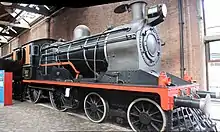| Indian Railways SP[1] | |||||||||||||||||||||||||||||||||||||||||||||||||||||
|---|---|---|---|---|---|---|---|---|---|---|---|---|---|---|---|---|---|---|---|---|---|---|---|---|---|---|---|---|---|---|---|---|---|---|---|---|---|---|---|---|---|---|---|---|---|---|---|---|---|---|---|---|---|
 | |||||||||||||||||||||||||||||||||||||||||||||||||||||
| |||||||||||||||||||||||||||||||||||||||||||||||||||||
| |||||||||||||||||||||||||||||||||||||||||||||||||||||
| |||||||||||||||||||||||||||||||||||||||||||||||||||||
| |||||||||||||||||||||||||||||||||||||||||||||||||||||
The Indian Railways SP class is a class of Indian steam locomotives used for passenger trains which was built around 1905. In the designation SP stands for Standard Passenger. The design originated from a BESA standard.
History
The standard SP series for passenger transport was presented in the first edition of the 1903 BESA standard. The 4-4-0 ("American") wheel arrangement with a leading bogie has already proven itself in India because it shows good smoothness even in poor track conditions. The SP series used the same boiler as the SG class standard goods locomotives, which had a diameter of 4 feet 8+1⁄4 inches (1,429 mm). In the 1910 BESA standard, a variant with a larger boiler was proposed, which had a diameter of 5 feet 1+1⁄4 inches (1,556 mm), as used in the PT class passenger tank locomotives.[2]
The locomotives were delivered to different railways, but only the Indian States Railways (ISR) operated railways used the type designation SP. Beyer-Peacock delivered a series of 10 pieces to the North Western Railway (NWR), whose route network lay in today's border area of India and Pakistan.[3]
Design
The locomotive was a two-cylinder saturated engine design with a Belpaire firebox. The grate was arranged between the coupled wheel sets. Between the frames were the two cylinders and the Walschaerts valve gear. A small cowcatcher was attached to the from buffer beam. The cab was completely enclosed, with the cab rear wall being formed by the three-axle tender.

A later version was created equipped with a superheater and designated SPS (Standard Passenger, Superheated); SP locomotives retro-fitted with superheaters were usually reclassified as SPC (Standard Passenger, Converted) An SPS locomotive, most recently operated by the Pakistan Railways is preserved in the Museum of Science and Industry (MOSI) in Manchester. The exterior of the locomotive is practically identical to that of the SP series.
See also
References
- ↑ "SG". Archived from the original on 6 January 2012. Retrieved 1 December 2013.
- ↑ "Third report of the Locomotive Committee on Standard Locomotives for Indian railways". Indian Industries and Power. March 1910. p. 275. Retrieved 2020-08-31.
- ↑ Shearsmith, Jan (2017-09-21). "Pakistan Railways Engine No. S/PS 3157, Part One: Production". Museum of Science and Industry Blog. Museum of Science and Industry, Manchester. Retrieved 2020-08-25.
- Hughes, Hugh (1990). Indian Locomotives: Part 1 – Broad Gauge 1851–1940. Harrow, Middlesex: The Continental Railway Circle. ISBN 0-9503469-8-5. OCLC 21871114.



